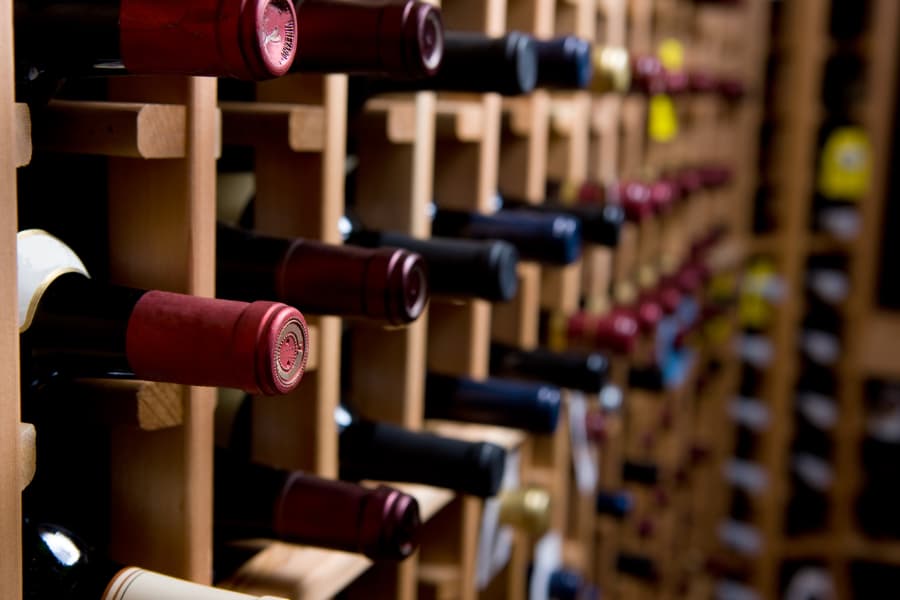
Whether you are a budding wine aficionado or have been tasting and collecting wines for some time, it is important to understand how long different varieties may last and how to store wines for their maximum longevity. Columbia Distributing in Oregon and Washington has some tips to store wines correctly. With some varieties getting better with age and lasting decades or longer, improper storage may ruin exceptional wines in a short amount of time.
Keep It Cool and Dark
No matter the variety, your wine storage should be in a dark and cool place. Temperatures too hot or too cold can spoil the wines. As a rule of thumb, it is recommended that wines be stored at around 55 degrees Fahrenheit. For storing temperatures for a specific type of wine, review the label or visit the wine brand’s website. No wine should be stored below 25 degrees, which will freeze it, or above 68 degrees, which can accelerate aging.
In addition, wines should be kept in a darkened area, specifically away from sunlight. Light can cause wines to degrade. A basement or cool, dark closet can be perfect for storing wines, especially if they meet the temperature requirements. Another option is to keep the wines inside a box with the top closed. Wherever you choose to store your wines, make sure they are in a temperature-stable environment.
Rest Wine Bottles on Their Sides
It is essential for wine bottles with corks to be kept horizontally. The cork must remain moist until the bottle is opened. Corks that have dried out may allow seepage of gasses and fluid, along with oxidation which causes the wines to go bad.
Even though some wine bottles have screw-top closures, storing all wines, alike, on their sides is efficient and saves space.
Shaking or Vibrations Can Harm Wines
While you might think a dark storage closet in the laundry room may be a good place for wine storage, it is not. Wines need to stay away from vibrations induced by a washer and dryer. And while soft music will not disturb wines, the vibrations produced by loud acoustics can be harmful. Stored wines need to sleep. Vibrations of any kind will upset the sediments and cause degradation.
Gauge the Humidity
Investing in a hygrometer is an inexpensive step toward ensuring proper storage. Humidity swings can be as bad for wines as temperature swings. Ideally, wines should be stored between 60 to 68 percent humidity, although somewhere between 50 and 70 percent is acceptable for most wines.
If the humidity remains at too high a level, some wines will start to mold. If the humidity is too low, the corks may dry out and allow oxygen into the bottle as mentioned previously, thus causing the quality of wines to deteriorate.
One quick fix may be to place a pan of water nearby if your wine storage area does not fall into the proper humidity requirements. Another option is to use a humidifier on a timer to properly humidify the wine room or closet.
Provide Proper Air Circulation
Just because it is suggested you store wines in the basement or a closet, it does not mean they should be kept in an area where the air becomes stagnant. Proper storage should have air circulation. One fix is installing a ceiling fan or providing a small portable fan, which you can turn on and off at will.
Without good circulation, the air surrounding the wines can affect the wine’s flavoring and harm it with any foul odors collected in the area. Stagnant air can also allow mold growth.
A Wine Refrigerator is Different From an Ordinary Refrigerator
If you have become more than a budding novice, you may wish to invest in a wine refrigerator to store unopened bottles. Unlike your general refrigerator, which is opened several times a day, a wine fridge remains dark, cool, and moist. The settings are made for temperatures and humidity levels conducive to proper storage. In addition, using a separate wine refrigerator prevents odor contamination from foods that accumulate in your household fridge.
How Long Can Wines Be Stored?
The length of storage time from your wine purchase to when you open the bottle depends on the type of wine. Some wines can be kept only for a couple of years, while others get better with age allowing you to store them for decades.
One way to judge is by the price of the bottle. Less expensive wines will remain good for only a few years. When you pay under $25 a bottle, you can expect that you will want to drink it soon.
As the price grows so will the wine’s storage life. Storing more expensive wines will increase their flavor and their value.
Feel Free to Ask Columbia Distributing About Wine Varieties and Their Storage Needs
Storing wines is a delicate process and understanding how to store wines is key to proper aging and longevity. Most wines like to be babied with proper temperatures, and humidity, in a quiet environment. Wherever you wish to store your wines, ensure you can maintain consistent temperatures and humidity levels, block out the sun and other light, and let your wine bottles lay on their side.
If you have questions about wine storage do not hesitate to contact the experts at Columbia Distributing in Oregon and Washington. We carry many brands, and our team has a vast amount of knowledge of all types of alcoholic beverages. We are here to assist you.